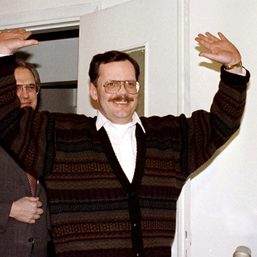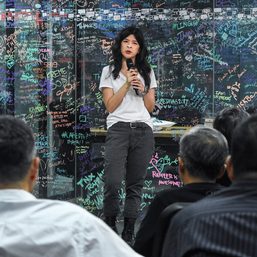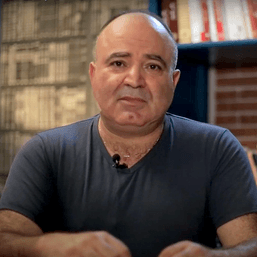SUMMARY
This is AI generated summarization, which may have errors. For context, always refer to the full article.
![[Newspoint] Journalism is debate](https://www.rappler.com/tachyon/2024/03/journalism-debate-march-23-2024.jpg)
I’ve never taken part in one myself, but I got initiated to debates observing what passed for them as early as when I was small. In fact, I remember the experience so well, and so fondly, my own choice of profession may have had to do with it, subconsciously.
I eavesdropped on my first debates watching through the street window of our village barbershop. Habitués went at one another with no specific proposition offered or sides drawn. Those debates were nothing at all like the formal kind, structured and moderated; they were a freewheeling affair. And I felt amused and redeemed from my own childish follies seeing those old men nearly come to blows sometimes.
Our barber was himself the debate conductor – the impresario – and also one of the argumentators, as such the one constant participant. So far as I know, despite the danger posed by the sharp implements of his trade in his hands, the proceedings drew not one drop of blood.
I wouldn’t really mind our own legislators having their own heated, even violent, debates so long as they did so with the same selfless ardor – not to mention sensibleness – as those barbershop debaters of my childhood.
But you might ask: How could there have been multiple debates going on, and free-for-all at that, when there was only one barber and one customer at a time?
Well, at the time, indeed from time immemorial, until coffee shops took them over, barbershops served as the most common venue where not just communal but even national issues were distilled by open argumentation. People thus went to the barbershop not only for a haircut, but also to voice their civic sentiments.
The scenario was in fact celebrated in my father-in-law’s newspaper column: He wrote from a barber’s viewpoint. And, writing daily, he was never lost for a case to argue or an argument to deploy.
The tradition actually dates back millennia. It is said that the Roman philosopher Cicero (106-43 B.C.) went to the barbershop more often than he needed a haircut; he went to survey his constituency’s feelings about the issues of the day and to pick up arguments he could readily use for his orations in the senate and more thoughtfully for his treatises. (Cicero, The Life and Times of Rome’s Greatest Politician by Anthony Everitt, Random House, New York, 2001). I won’t be surprised if reporters joined him, the celebrity that he was.
Anyway, as I searched and collected my thoughts for parallels between journalism and debating, I realized that both tasks do harness the same disciplines. That may not be apparent to a reporter, the entry-level position for journalists, for, as a first rule, reporters are commanded to confine themselves to facts – those facts that make for a story, and that story that needs propagating because it impacts many lives – a prowling pandemic, an impending natural disaster, rising prices, additional taxes and other state levies, etc.
But even as reporting is confined to facts, and reporters are prohibited from injecting their opinion in their reporting, in a way they are encouraged to provoke debates among people whose views can contribute to the appreciation of public issues. Reporters seek out people in the know – “resource persons,” as they are now called – and report their clash of opinions to set the story in a larger context than if told with just the bare facts. That way, though not allowed to take part in the debates themselves, they’re able to provoke debates and even get members of the public themselves debating, which makes for a further refinement of their decision making.
But the one aspect of journalism that bears the closest resemblance to debating is opinion writing, precisely the journalism I mostly do now. Quite naturally, every time I write I perforce debate; I argue my position on the moment’s issue, just as a debater speaks his side to the proposition at hand. And I imagine we both go through the same careful and rigorous preparations.
We don’t speak off the top of our heads; we collect facts and authoritative pronouncements that will reinforce our position and at the same time demolish, or at least weaken, the opposite position. Then we might offer our own takeaways; I say “might offer” because I’d be wary myself doing that if I hadn’t pre-tested them, bounced them off some devil’s advocates.
From such material, we build our case, and we do that in a way calculated to win audiences and jurors to our side. Yes, jurors too in my own case, for among my audiences are voters – electoral jurors – or otherwise free voices in the court of public opinion. Surely, opinion writers and debaters can both use some skills at prose-making – rhetoric.
Rhetoric is to verbal construction as architecture and engineering are to civil works. The challenge is to build a case that is at least sightly, yet able to withstand the fiercest storms of rebuttal. For that, some ear for prose and, for debaters especially, oratory, as well as an objective, critical mind for exposition, is certainly useful.
Come to think of it, life itself is an endless debate, whether at home or in school or at work – the endless challenge is to prove you’re right, or at least have something better to offer. Debating should, therefore, make for a suitable ground for developing and polishing the skills of rhetoric and critical thinking; thus, it should not be a bad idea to make debating a compulsory study, not just an extracurricular activity. It can help deepen a learner’s grasp of the disciplines, whether math or history or economics or any of the natural and social sciences. But I should also warn about taking life too seriously.
Indeed, there’s much to life that ought to be taken with humor too. Leavened with humor, opinion making and debating can be made more wholesome and fetching without taking away from its effectiveness. For one thing, humor can lessen the chances of a discussion deteriorating into something more hurtful than an exchange of words, which can be hurtful enough. – Rappler.com
This piece has been adapted from a talk the writer gave on March 22, 2024 to an audience of debaters at Xavier School, Xavier St., Greenhills, San Juan City.
Add a comment
How does this make you feel?
![[OPINION] Badoy’s red-tagging and freedom of expression](https://www.rappler.com/tachyon/2024/04/20240426-Badoy-red-tagging-freedom-expression.jpg?resize=257%2C257&crop_strategy=attention)




There are no comments yet. Add your comment to start the conversation.